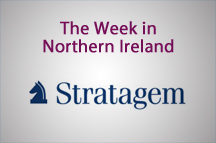.gif) It is now nearly a year since we last had an Assembly or Executive in Northern Ireland. Despite going to the ballot box four times in the last two years, the region remains under the stewardship of the Head of the Civil Service, David Sterling, and a team of permanent secretaries with Secretary of State James Brokenshire making it very clear that we are not under direct rule.
It is now nearly a year since we last had an Assembly or Executive in Northern Ireland. Despite going to the ballot box four times in the last two years, the region remains under the stewardship of the Head of the Civil Service, David Sterling, and a team of permanent secretaries with Secretary of State James Brokenshire making it very clear that we are not under direct rule.
The 2016 Assembly election was quickly followed by the Programme for Government, developed with a new focus on outcomes. It moved away from the traditional model of counting inputs and outputs, toward a shared approach to the delivery of public services and ‘turning the curve' on long-term social and economic challenges.
A new Industrial Strategy explored how Northern Ireland could become a globally competitive economy. Coupled with continued positive noises about corporation tax, activity seemed to be at least moving in the right direction.
Fast forward 12 months, and whether one is a leaver or remainer, a devolutionist or a direct-ruler, the lack of devolved institutions doesn’t make for a lack of political activity. It’s been fascinating for those of us on this side of the Irish Sea to observe reactions to the DUP and its critical interventions on both Brexit and non-Brexit matters at Westminster – it is definitely making its presence felt.

From protecting the triple lock pension to securing changes to the agreement between the UK and the European Commission last week, the DUP is enjoying its time at the heart of the union.
Some of the practical outputs of the party’s ‘confidence and supply’ agreement with the Conservatives emerged at the last Budget when the Chancellor, Philip Hammond, announced his intention to open talks on a Belfast City Deal, one that should lead to similar arrangements in other parts of Northern Ireland. Beyond that, he committed to reviewing the effect of APD and VAT on tourism in the region.
While the DUP’s negotiation skills are laudable, its membership of Westminster committees important and the support for Theresa May critical, it might not be able to hold back the tide of events in parliament and could lose the leverage it currently enjoys.
Will Sinn Féin return to power sharing in the North? It all depends on whether such a move is in its strategic interests. Public support for Irish Prime Minister Leo Varadkar’s handling of Brexit negotiations may have reduced the probability of Sinn Féin doing as well as it would like in any future election in the Republic of Ireland, but, even against the backdrop of Gerry Adams’s preparations to retire as party president in the coming months, the party will remain focused on growing in the South.
As 2017 draws to a close, the best solution to the challenges faced here is locally elected ministers making locally informed decisions. In the absence of this, however, are their direct rule counterparts warming up on the sidelines, preparing to provide stewardship and plug the gaps to which we have grown accustomed?













